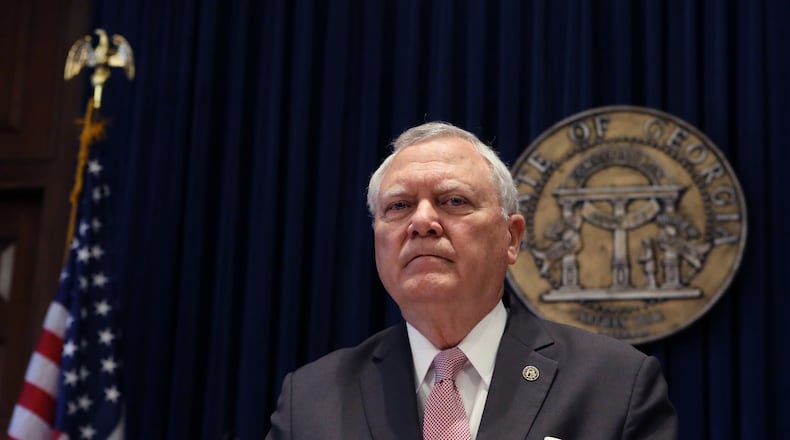The Atlanta March for Science aims to send a message to Donald Trump's administration about "increasing cynicism" toward climate change and a "cavalier" attitude toward facts. So to say organizers were stunned by Gov. Nathan Deal's response to an invite to the event would be an understatement.
In a letter postdated for the April 22 event, the governor wrote it was a “pleasure to be a part of your event” and commended the planning committee for “spreading knowledge about science and its advancements.”
“It was a really big deal,” Dr. Jasmine Clark, a microbiologist who organized the Atlanta event, said of Deal’s response. “We were very surprised. We were also really excited. It was a mixture of surprise and excitement all around.”
It was not the type of response they expected for the Earth Day gathering, which was inspired by the Women’s March that attracted hundreds of thousands of demonstrators in Washington, Atlanta and other U.S. cities the day after Trump’s inauguration.
The science offshoot, the Atlanta organizers wrote Deal, was nonpartisan and “motivated by sincere patriotism.” But it also is meant to raise a warning flag about a disdain for “uncontroversial scientific findings,” such as climate change and the need for immunizations.
Deal’s office said the message was not intended to be an endorsement or a show of support for the march, and that it amounted to a customized form letter sent by an aide in his constituent services department. He is not planning on attending the event, a spokeswoman said.
“The governor’s office receives hundreds of correspondence and requests for letters a week, and we rarely if ever reject constituent requests,” his office said in a statement.
Indeed, Deal receives a flood of requests for photos, letters and resolutions each year. The office said it has processed more than 300 letter requests since February, and rejected less than 1 percent.
Among some Republicans, the "uncontroversial" science outlined in the letter to Deal are anything but that.
Trump has called global warming a “hoax” and urged a rollback of Environmental Protection Agency regulations that has infuriated some government scientists. Federal researchers working for NASA, the Department of the Interior and other agencies have created “renegade” social media accounts for fear of being silenced.
And while Deal has tried to sidestep the debate over climate change - he's said it's a federal and international policy issue - he's raised concerns about a host of environmental regulations adopted by Barack Obama's administration.
Clark, for her part, was not deterred by the attempts to downplay his dispatch.
"We reached out to his office for an endorsement, and we got this letter," she said.
She said organizers are planning for more than 20,000 demonstrators to attend the event, though the planning committee has yet to pin down the location.
The event, she said, intends to “show the people who are in charge of policy-making that there are a lot of people out there who are really interested in having evidence-based policy over ideology.” She added that she’s happy to count Deal an ally.
“We’re happy to have this support from him,” she said. “As long as he believes in our mission, to us it was a really big deal. We were really glad and sincerely thankful for the endorsement from the governor’s office.”
Below you'll find the original letter sent by Bradley Cooke, a Georgia State University neuroscience professor, sent to Deal's office:
Dear Governor Deal,
I am writing to you on behalf of the organizers of the Atlanta March for Science, which will be held in Atlanta on April 22. The reason I am writing is to inform you of the march and to invite you to join us and your constituents at the march.
The purpose of the March is to remind the citizens and leadership of Georgia how important science is for our public health and for understanding the natural world. Specifically, the mission statement is as follows:
The March for Science champions publicly funded and publicly communicated science as a pillar of human freedom and prosperity. We unite as a diverse,nonpartisan group to call for science that upholds the common good and for political leaders and policy makers to enact evidence based policies in the public interest.
Our mission is non-partisan and motivated by sincere patriotism. The great Centers for Disease Control could not exist without a firm grasp on reality as revealed through the scientific method. Science and empiricism are essential to the design and execution of successful public policy. In this era, science matters more than ever.
We scientists are also increasingly concerned about the direction of our country's politics. Specifically, we are alarmed at the increasing cynicism of citizens toward uncontroversial scientific findings, such as the value of immunizations or the rapidly warming temperature of our planet earth.
This is coupled with a degeneration of our leaders' adherence to the truth, as evidenced by the cavalier attitude of some toward using spurious claims to support one's agenda. The health of our country depends on leaders that know the facts, and I hope you agree. If you agree that science is important, I'd like you to join us at this March, publicly support the mission and invite your constituents to as well.
More details about the time and the place of the March will be forthcoming, but I send this to you now in hopes that (you can) join us to March For Science.
Update: After the above story ran, we received this statement from the March organizers:
"We at the March for Science Atlanta look forward to working with members of the Georgia legislature to advocate for evidence-based policy making that affects all Georgians. While Governor Deal has expressed that he does not plan to attend the march, we will continue our mission to reach out to policy makers, regardless of party affiliation, to promote policies that are backed by scientific data and to make sure science is not silenced."
About the Author



